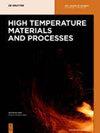Simultaneous extraction of uranium and niobium from a low-grade natural betafite ore
IF 1.5
4区 材料科学
Q4 MATERIALS SCIENCE, MULTIDISCIPLINARY
引用次数: 0
Abstract
Abstract This work efficiently investigated the simultaneous extraction of uranium (U) and niobium (Nb) from a low-grade natural betafite ore by using novel technique, namely, sulfatizing roasting coupled to sulfuric acid leaching process. First, the sulfatizing roasting was adopted to alert the properties of the raw ore, aiming to destroy the crystal structure of the ores and convert the valuable elements to soluble sulfate compounds. Moreover, the influences of the parameters affecting the sulfatizing roasting including roasting temperature, amount of sulfuric acid, and roasting time were studied. The results indicated that the extraction of U and Nb from the ores with sulfatizing roasting was an order of magnitude higher than the extraction of U and Nb from the ores without roasting under the same test conditions. Then, the effects of amount of sulfuric acid concentration, liquid–solid ratio, leaching temperature, and leaching time on U and Nb recoveries were systematically investigated. To verify the process parameters of extracting U and Nb for the novel technique, three validating tests were conducted, and the results showed that over 95% of U and 85% of Nb were leached out under the optimal conditions. The novel technique was proven as advantageous since it conspicuously improved the leaching rates of U and Nb and promoted the refractory natural betafite ores to become an economic source for uranium.从低品位天然betafite矿石中同时提取铀和铌
摘要本工作采用硫酸化焙烧-硫酸浸出相结合的新工艺,有效地研究了从低品位天然贝塔矿中同时提取铀(U)和铌(Nb)的工艺。首先,采用硫酸化焙烧来警示原矿的性质,旨在破坏矿石的晶体结构,将有价值的元素转化为可溶性硫酸盐化合物。研究了焙烧温度、硫酸用量、焙烧时间等因素对硫酸化焙烧的影响。结果表明,在相同的试验条件下,用硫酸化焙烧从矿石中提取铀和铌比不焙烧从矿石提取铀和Nb高一个数量级。然后,系统地研究了硫酸浓度、液固比、浸出温度和浸出时间对铀和铌回收率的影响。为了验证新工艺提取铀和铌的工艺参数,进行了三次验证试验,结果表明,在最佳条件下,铀和铌分别浸出了95%和85%以上。这项新技术被证明是有利的,因为它显著提高了铀和铌的浸出率,并促进了难处理的天然贝塔矿成为铀的经济来源。
本文章由计算机程序翻译,如有差异,请以英文原文为准。
求助全文
约1分钟内获得全文
求助全文
来源期刊

High Temperature Materials and Processes
工程技术-材料科学:综合
CiteScore
2.50
自引率
0.00%
发文量
42
审稿时长
3.9 months
期刊介绍:
High Temperature Materials and Processes offers an international publication forum for new ideas, insights and results related to high-temperature materials and processes in science and technology. The journal publishes original research papers and short communications addressing topics at the forefront of high-temperature materials research including processing of various materials at high temperatures. Occasionally, reviews of a specific topic are included. The journal also publishes special issues featuring ongoing research programs as well as symposia of high-temperature materials and processes, and other related research activities.
Emphasis is placed on the multi-disciplinary nature of high-temperature materials and processes for various materials in a variety of states. Such a nature of the journal will help readers who wish to become acquainted with related subjects by obtaining information of various aspects of high-temperature materials research. The increasing spread of information on these subjects will also help to shed light on relevant topics of high-temperature materials and processes outside of readers’ own core specialties.
 求助内容:
求助内容: 应助结果提醒方式:
应助结果提醒方式:


